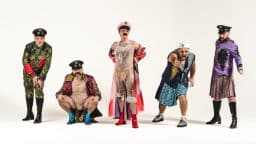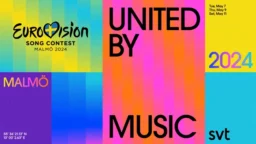Whew, there’s so much to tell about Pasha Parfeni, the singer representing Moldova – again! – at the Eurovision Song Contest 2023 in Liverpool. We’ve made a selection for you: the ten things you need to know to fully understand Pasha’s song Soarele şi Luna.
The song (a fairy tale…),
the lyrics (…about cosmic love…)
and the act (…with horns and flutes!).
1. Yuliana
That’s Pasha’s wife, she plays a central role in his music and his entire career. She writes, composes, and inspires Pasha – in interviews, he calls her his muse. Yuliana also wrote the lyrics to Soarele şi Luna (‘The Sun and the Moon’), the song that Pasha will perform on stage at Eurovision 2023.
2. The story
In the song, the protagonist sings about his bride, whom he dreams of as he walks through dense forests or along the Dniester (the second largest river in Ukraine and the largest in Moldova), as night falls and the moon and stars illuminate their love. ‘I sang for her, I danced with her, I did everything for her until she finally wanted to kiss me. I promised her a wedding under the starry sky. The sun and the moon wear our wedding crown.’
3. A fairy tale
During Pasha’s performance, there’s a lot to see on stage: drummers, fiery colors, dancers with horns on their heads, a flute player dressed in something resembling a traditional costume. Pasha himself explains Soarele şi Luna as a love story originating from old Moldovan fairy tales. ‘Sometimes, when you find the right love at the right time, everything in the universe seems to come together,’ says Pasha. ‘The hero of my story talks about his love but speaks with equal love about Mother Nature, about the trees and the river, about the sun and the moon. This is not ordinary love, but cosmic love.’
4. Horns…
But what exactly do those visual elements on stage mean? The horns, for example? ‘I’ve been asked that question many times,’ says Pasha. ‘In Moldovan folklore, we know of Muma Pădurii (‘Mother of the Forest’), who protects nature and animals. On stage, we’ve visualized her as the women with horns – they protect our love and, above all, the future for that love.’
5. … and a flute player
According to Pasha, the flute player also represents a character from Moldovan mythology: ‘Statu-Palmă-Barbă-Cot’, a wise figure (always described in the stories as no larger than your forearm) who helps the hero with critical questions and wise answers. ‘He too is meant as a love protector,’ says Pasha. ‘A bringer of luck. I’ve gathered only love and protection around me on stage.’
6. 2012
That’s all well and good, but maybe you’re mostly wondering: where do I know that Pasha from? The loyal Eurovision viewer might already know: with the song Lăutar, the same Pasha reached 11th place in the final of the Eurovision Song Contest 2012. Contrary to what the title suggests, he sang in English, about a singer who forgets his lyrics, a musician who forgets his notes because she, she is looking at him and laughing. The title is difficult to translate, ‘Violinist’ comes closest, ‘lăutari’ are very specific musicians from Romanian and Moldovan history – which, of course, brings us back to Pasha’s Moldovan fairy tale at Eurovision 2023.
(By the way, Pasha isn’t the only one from the ‘class of 2012’ returning this year. A few weeks before the Song Contest, at one of the ‘pre-parties’, he had a special reunion with… Loreen! While Pasha finished 11th in the 2012 final, we all know what Loreen did.)
7. … and 2013!
And a year later, he was back on that Eurovision stage. The 2013 Moldovan entry, O mie (‘A thousand’) was sung by Aliona Moon (who was Pasha’s backing vocalist the year before), but who’s behind the piano? Pasha was one of the writers of O mie. The other writer? Yuliana, his wife! Together they wrote about a lost love. ‘A thousand sunsets drowned in the sea […] The sun and the rain make a thousand colors together, but the only thing we see are the clouds.’
8. And 2009, 2010, 2011…
Yes, because Pasha breathes Eurovision. Fully in line with expectations, as the child of a piano teacher and a guitarist, he followed various musical courses. In 2008, he stood at the start of the band SunStroke Project as lead singer. He wrote and composed No crime, the song with which they finished third in the Moldovan pre-selection in 2009. So, they didn’t make it to the Song Contest, and Pasha left the band the same year. Solo, he tried again in 2010, but he finished second — narrowly behind, yes, SunStroke Project! Fortunately for Pasha, after another failed attempt in 2011, he finally made it.
9. And 2015, 2020, and, and, and…
But anyone who thinks that Pasha was done with Eurovision after his participation in 2012 and 2013: well, no. In 2015, he wrote a song for the group DoReDoS, which didn’t make it to the Song Contest (but did three years later)! In 2020, he tried once again, but again didn’t make it.
10. And lots of firsts…
In 2023, it finally happened, and Pasha Parfeni once again represents Moldova at the Eurovision Song Contest. Eleven years after his 11th place in Baku. He finished first in the Moldovan jury vote, first in the Moldovan public vote. That’s a lot of firsts – time will tell if it was a prediction for the final Eurovision result.
Photo: TRM / Eurovision.tv






